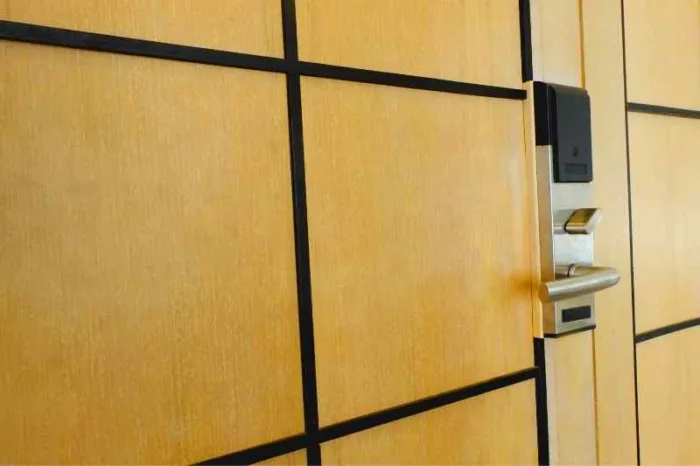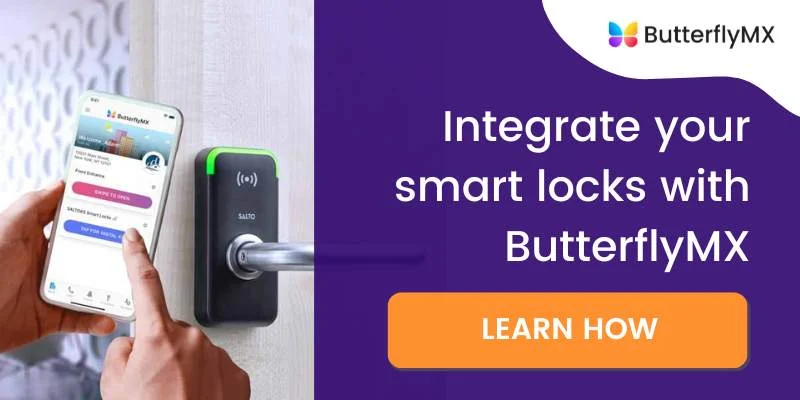Key takeaways
- The best commercial smart lock systems integrate with ButterflyMX, support cloud-based management, and offer multiple door unlocking methods.
- Commercial smart locks are electronic lock sets that operate without a traditional key. They typically connect to tenants’ smartphones.
- Connect smart locks to smartphones via WiFi, Bluetooth, or Z-Wave technology.
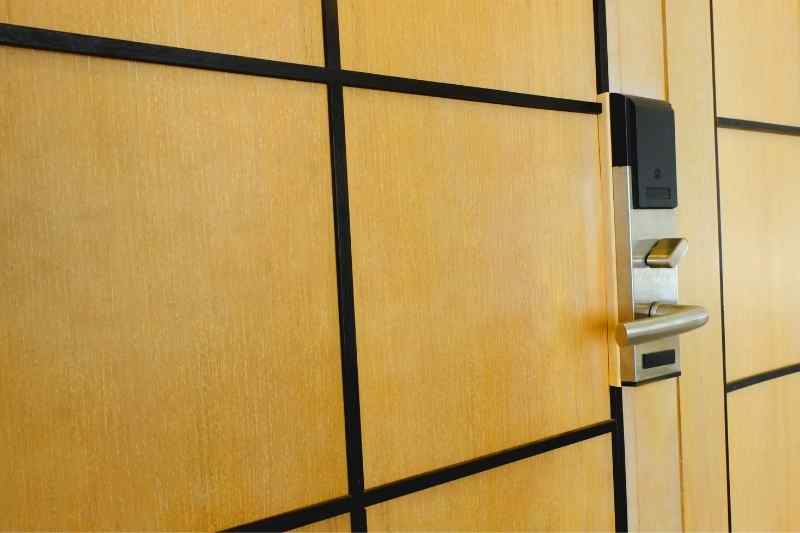
As a business owner, the security of your commercial property and employees is a top priority. With technological advancement also comes innovative ways to maintain premier security and safety. And commercial smart locks are the latest amenity that tenants crave — both for convenience and reliability.
The best part about smart commercial doorlocks is that they eliminate the need for brass metal keys. Instead, they empower tenants to unlock doors using their mobile devices or PIN codes. Read on to discover the best smart locks for businesses. Then, explore different types of smart locks, how they work, and how to choose the best one for your property.
This post covers:
- 3 best commercial smart locks
- What is a smart lock for business?
- Types of commercial smart locks
- How commercial smart door locks work
- Key features of the best commercial smart locks
- Commercial smart lock FAQs
3 best commercial smart locks
With so many diverse options on the market, how do you choose the best smart lock for your business?
Here are our picks for the best commercial smart locks on the market:
1. Dormakaba EVO LZ
2. Yale Assure 2 WF1 Deadbolt
3. Schlage Encode Series
1. Dormakaba EVO LZ
Offering high-quality performance without compromising aesthetics, the dormakaba EVO LZ is one of the best smart locks for businesses.
Here are some key features of the dormakaba EVO LZ smart lock:
- Multiple ways to open. Unlock any door with a PIN code, key fob, virtual keys, and more.
- Durable. This BMHA-grade certified office smart lock is built to last.
- Large storage capacity. This lock stores up to 2000 users. So, it’s great for large-scale commercial buildings.
- WiFi connectivity. Dormakaba commercial WiFi door locks are WiFi connected — without the use of a hub or plug-in.
- Integrates with ButterflyMX. Offers 365° connectivity – including lock updates, entry events, door release logs, and access updates that are easily managed through the ButterflyMX app or web dashboard.
2. Yale Assure 2 WF1 Deadbolt
The Yale Assure 2 deadbolt is one of the best smart locks for commercial glass doors, bringing keyless convenience to your front entrance.
The Yale Assure 2 WF1 Deadbolt offers:
- Several ways to open. Unlock any door with a PIN code or with a swipe-to-open using your smartphone. What’s more, the Yale Assure deadbolt even empowers you to send virtual keys to guests.
- Auto-locking technology. Automatically locks after use for heightened security. So, unauthorized guests can’t tailgate a tenant into the building.
- Long battery life. Batteries last up to 12 months for reliability and convenience.
- Compatible with ButterflyMX. Yale office smart locks integrate with ButterflyMX for seamless property-wide access.
3. Schlage Encode Series
Maximizing reliability and security, the Schlage Encode series offers heavy-duty commercial door locks that you can trust.
Here are some key features of the Schlage commercial smart lock:
- Multiple colors and finishes. Comes in a variety of colors and modern finishes that are sure to suit any door.
- Durable and reliable. Offers enhanced durability with a UL fire rating.
- WiFi connectivity. Control your commercial electronic door lock system remotely with a mobile app or web dashboard.
- ButterflyMX integration. This integration empowers you to receive 24/7 alerts and lock updates and unlock any door with just a smartphone swipe.
What is a smart lock for business?
A commercial smart lock is an electromechanical lock system with smartphone-powered locking and unlocking functions for doors on a commercial property. More specifically, smart locks for businesses are designed to replace traditional locks that require physical keys. Instead, property owners, managers, staff, and tenants can use their smartphones
or enter PIN codes to open doors.
While it’s very common to see smart locks on apartment and hotel doors, it’s entirely possible that you haven’t seen them on office doors.
So, you’re probably wondering: Can you put a smart lock on a commercial door?
The answer: Yes, you certainly can install smart locks on commercial doors! In the past, commercial smart door locks were mainly exclusive to high-security businesses. But today, they’re installed at commercial properties of all kinds.
For example, retail business owners secure their stores with a storefront smart lock as an alternative to traditional door locks for heightened security and convenience. Since smart locks are connected to the internet, property owners can view audit logs of all door entry activity to ensure that only authorized employees are entering the space at any given time. And they won’t have to carry around physical keys to enter their building.
Watch how ButterflyMX works:
What is a commercial-grade lock?
A commercial-grade lock is made from quality materials to ensure its strength, durability, and application, following the Building Hardware Manufacturers Association (BHMA) standards and guidelines.
As an accredited American National Standards Institute (ANSI) association, BHMA uses a trusted 1, 2, and 3 grading system — with 1 representing the best — to define product quality.
So, when choosing a commercial smart lock system for your business, consider the lock’s grade and where it’ll be installed. For instance, if you’re looking for a smart lock for a commercial glass door, consider getting a mortise lock to maximize security while ensuring minimum damage to the glass.
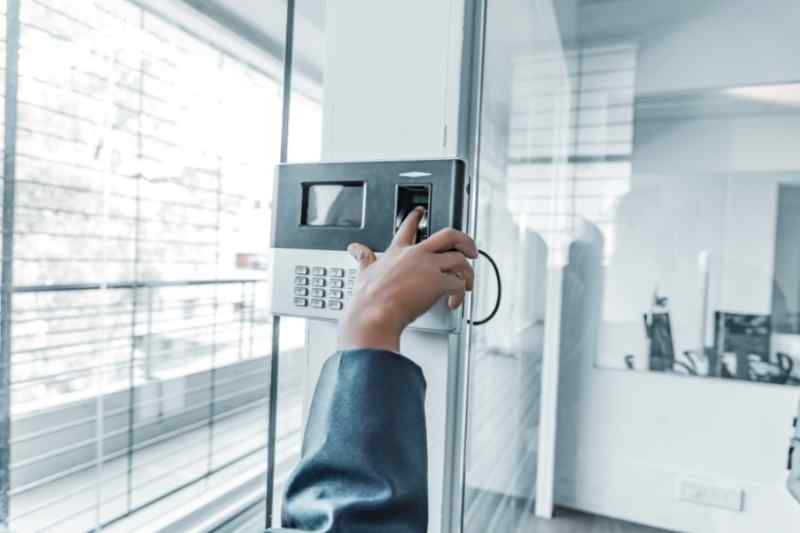
Types of commercial smart locks
Now that we’ve gone over what they are, you’re probably wondering: Are commercial door locks different from residential ones? Simply put, smart locks for businesses are slightly more robust than those found at residential properties.
This is because commercial properties usually have more foot traffic than residential buildings. So, smart commercial door locks must be made of long-lasting, durable material to accommodate multiple door lockings and unlockings throughout any day.
Because there are many commercial properties, finding the right kind of smart lock for your building is crucial. Depending on your property’s needs, one option could be better.
The most common commercial smart locks are:
WiFi door lock
Commercial WiFi door locks operate by connecting to a building-wide wireless internet connection. Tenants can unlock the door by entering a code or using their smartphones. Because the lock is always connected to the internet, tenants can open doors for trusted guests from anywhere in the world.
Bluetooth door lock
Similarly, commercial Bluetooth door locks also work by connecting to a wireless connection. However, unlike WiFi-enabled locks, Bluetooth door locks only work when a tenant’s mobile device is close to the lock.
As you know, Bluetooth is commonly employed in headsets for mobile phones, enabling hands-free phone use. However, the two devices can’t connect when they’re far apart. So, Bluetooth smart locks only work when the tenant is holding their mobile device within a few feet of the door.
Mobile-based door lock
What commercial WiFi and Bluetooth smart locks have in common is that they’re both smartphone-based keyless locks. As such, mobile-based door lock systems allow tenants to open the door using a Bluetooth connection or an app on their smartphones.
Many mobile-based smart locks have multiple ways to unlock the door, such as:
- Voice commanding through Siri or Alexa
- Tapping on a smartwatch
- Scanning a fingerprint
Z-Wave door lock
Z-Wave door locks use mesh networks, sending data from the hub to one device and then to another. An advantage of this wireless method is that data can reach devices outside the Wi-Fi range. This is made possible because, with Z-Wave technology, data hops along a pathway created by other devices acting as a connection extender.
Also known as Zigbee, Z-Wave networks are ideal for bigger commercial properties with outdoor spaces that are outside the WiFi range. For example, Z-Wave door locks may be best suited for industrial facilities that have storage or workshop units spread throughout the property.
How commercial smart door locks work
When you install an office smart lock, you’ll empower tenants to unlock the door without using a key or keycard.
Here’s how tenants unlock doors with commercial smart locks:
- Once the smart locks are installed, tenants will download the corresponding mobile app or create a unique PIN code.
- When at the door, tenants will present their access credentials. They’ll either use their smartphones or enter a PIN code to unlock the door.
- If their credentials are correct, the system will automatically unlock the door. The deadbolt will release, allowing the tenant to swing open the door.
- When the door closes, the smart lock returns to the locked position.
Note: Some smart lock models still have a keyhole that allows you to use a traditional key in the event of an emergency or power outage. And some smart locks attach to existing deadbolts, while others replace deadbolts entirely. Regardless of your type, your smart lock will require a wireless connection like Bluetooth or WiFi.
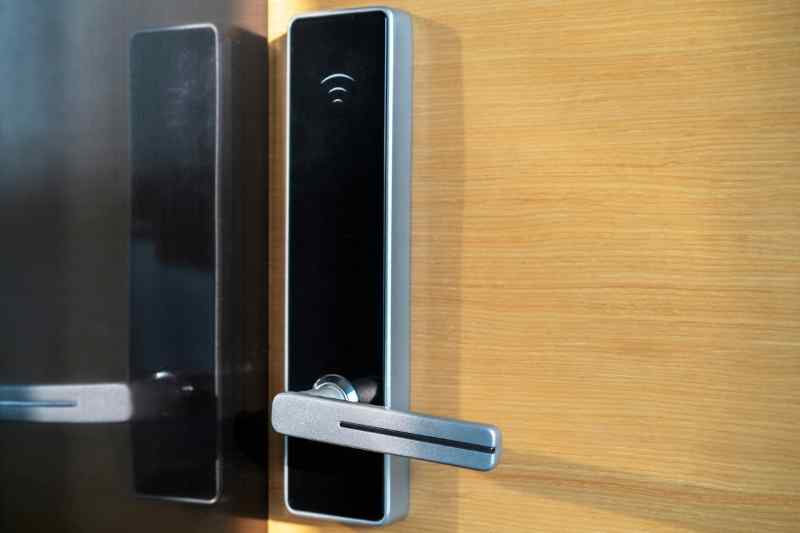
How much does a commercial smart lock cost?
The cost of a commercial smart lock ranges from about $200-$600 per lock, depending on the brand, features, and commercial-grade rating. A smart lock requiring a full deadlock replacement will cost more, while those that connect to existing deadlocks via an adapter will cost less.
But keep in mind: You must also consider installation costs, which are separate from the device costs.
Key features of the best commercial smart locks
With many different smart locks on the market today, choosing the best one for your commercial property may be hard. However, there are some key features that you should seek out in a commercial smart lock system. Finding one that checks all the boxes will help narrow your search!
Here are key features of the best commercial smart locks:
Cloud-based management
Choose a commercial smart lock system that can be managed remotely on the cloud.
This means that you or your staff don’t need to come on-site whenever tenants’ access credentials need to be updated. Instead, you can log onto an online dashboard to assign or revoke access permissions from anywhere with internet access.
What’s more, cloud-based smart locks run automatic software updates, so you can rest assured that they’re always running on the latest version. This also means that the smart locks will troubleshoot themselves whenever bugs or issues arise.
Proptech integrations
While almost all smart locks connect to a mobile app, some have more integration capabilities than others. Choose a system that integrates seamlessly with the other proptech devices throughout your property, such as the front entry intercom and smart lighting. That way, you can manage all building processes from one central hub.
When integrated, the smart lock can trigger other smart devices and activate automatic actions, such as turning on or off the lights when the office door is unlocked or locked. Such integrations simplify property management and elevate the tenant experience.
What’s more, ButterflyMX integrates with a wide variety of smart locks that make property-wide access simple.
Here’s how integrating your smart lock system with ButterflyMX can benefit your building:
- Real-time notifications. When smart locks are integrated with a video intercom, property managers and owners receive instant time- and- date-stamped photos of all entry events.
- Detailed audit logs. Access door release logs of all entry events through a mobile app or web dashboard.
- Visitor Passes. Send single-use or time-specific digital keys to guests and service providers.
- Elevator controls. Control and manage access to your key-fobbed elevator with just a swipe of a smartphone.
Multiple ways to unlock doors
Sure, smart locks eliminate the need for physical keys by operating with smartphones. But what happens when your hands are full or your phone is dead?
That’s why you need a commercial smart lock system that supports multiple ways to unlock doors.
The newest smart locks available today enable geofencing, which will trigger the lock based on your location. This is made possible via Bluetooth, cellular signal, GPS, and WiFi.
Having multiple ways to open doors with smart locks adds convenience to tenants’ daily lives — they can get into the office under any circumstances!
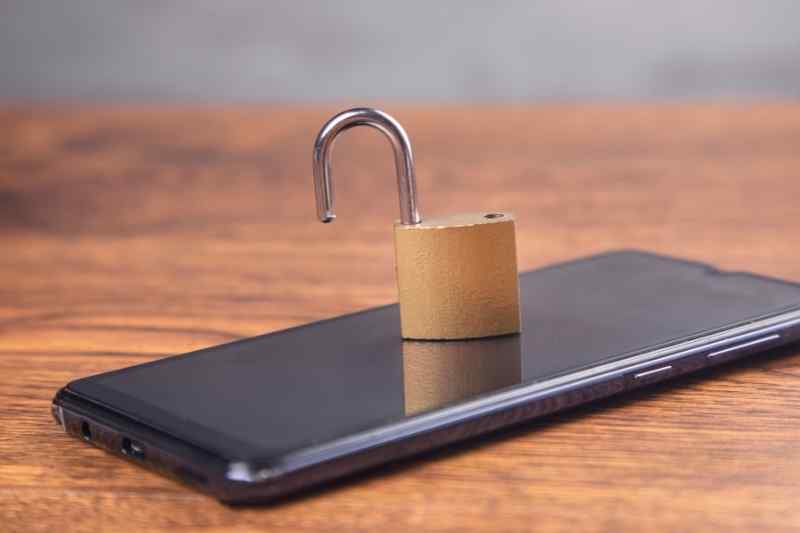
Commercial smart lock FAQs
Here are some commonly asked questions about commercial smart locks:
- What is the difference between a commercial lock and a residential lock?
- Can a locksmith open a smart lock?
- Are any smart locks actually secure?
What is the difference between a commercial lock and a residential lock?
The difference between a commercial lock and a residential lock is that commercial locks are designed to maximize durability and security. This is because heavy-duty commercial door locks are supposed to withstand heavy use and traffic.
Can a locksmith open a smart lock?
Yes, a locksmith can open a smart lock. However, depending on the model, smart locks can be more difficult to open and may require special tools or some level of programming knowledge.
Are any smart locks actually secure?
Yes, smart locks are secure because they require access credentials, like a smartphone, that can’t be lost, stolen, or cloned like traditional brass keys.
